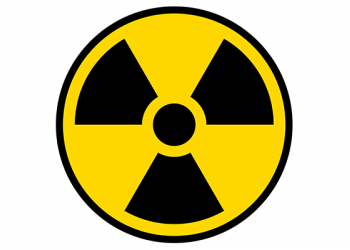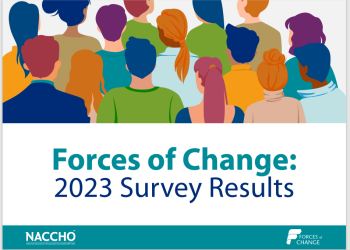By Hannah Donart, NACCHO Environmental Health Intern
 Cryptosporidium (Crypto) is one of the most common causes of diarrheal disease outbreaks associated with recreational water activity in the United States and these outbreaks are occurring at increasing frequencies. In 2016 alone, state health departments reported at least 32 outbreaks of the disease associated with swimming pools and water parks,doubling the reports from 2014. After swallowing contaminated water (i.e., containing fecal matter) Crypto attacks the digestive and respiratory tract causing diarrhea, stomach cramps, dehydration, nausea, vomiting, fever, and weight loss. It doesn’t take much for the disease to spread, either; exposure to only a few of these microorganisms can bring on the illness. Crypto is also extremely chlorine-tolerant and more likely to cause long-term, severe symptoms in individuals with suppressed immune systems. In order to effectively address these risk factors, local health departments and aquatic facility inspectors need to be properly trained on how to prevent Crypto outbreaks and appropriately treat contaminated water.
Cryptosporidium (Crypto) is one of the most common causes of diarrheal disease outbreaks associated with recreational water activity in the United States and these outbreaks are occurring at increasing frequencies. In 2016 alone, state health departments reported at least 32 outbreaks of the disease associated with swimming pools and water parks,doubling the reports from 2014. After swallowing contaminated water (i.e., containing fecal matter) Crypto attacks the digestive and respiratory tract causing diarrhea, stomach cramps, dehydration, nausea, vomiting, fever, and weight loss. It doesn’t take much for the disease to spread, either; exposure to only a few of these microorganisms can bring on the illness. Crypto is also extremely chlorine-tolerant and more likely to cause long-term, severe symptoms in individuals with suppressed immune systems. In order to effectively address these risk factors, local health departments and aquatic facility inspectors need to be properly trained on how to prevent Crypto outbreaks and appropriately treat contaminated water.
The Centers for Disease Control and Prevention (CDC) recently highlighted the spread of Crypto during its annual Healthy and Safe Swimming Week (May 22-28, 2017). This year’s theme was “Diarrhea and Swimming Don’t Mix,” and focused on four broad guidelines local health departments and recreational facilities could use as resources in educating the public, aquatic facility operators, beach managers, and health care providers. These measures include:
- Stay out of the water if you have diarrhea
- Shower before getting in the water
- Don’t pee or poop in the water
- Don’t swallow the water
Another important tip mentioned was to avoid swimming if you have an open wound. In addition, swim diapers are not leak proof, offering little more protection than a bathing suit, and do not protect against fecal contamination of the water. CDC’s comprehensive risk management strategies encompassing the “12 Steps for Prevention of Recreational Water Illnesses” should be incorporated into recreational water facilities’ day-to-day procedures. These 12 steps encompass improved equipment and design of facilities, better developed pool policies, and further training and education of management and staff. With the 2017 summer season upon us, it would be prudent to start making these changes now.
NACCHO and CDC also jointly promoted the Model Aquatic Health Code (MAHC),evidence-based guidelines developed by the CDC to prevent and reduce recreational water illnesses as a critical tool to address the rising Crypto threat. Coordinating with the Healthy and Safe Swimming Week 2017, NACCHO’s MAHC Network, a community for MAHC users, subject matter experts, and those hoping to learn about the code itself, focused its bi-monthly webinar on, “Recommendations for reducing Cryptosporidium infection risk at swimming pools.” Attendees heard from numerous subject matter experts, who emphasized the need for the reevaluation of recreational water treatment techniques and updated guidelines for pools and other aquatic facilitates in order to reduce the health risks associated with Crypto.
Alternative treatments that are known to be effective in eliminating Crypto include hyperchlorination (e.g., high levels of chlorine) for extended periods of time, ultraviolet light, ozone treatments, filtration, increased circulation flow rates, flocculants, and water replacement based on the number of swimmers. However, as Jennifer Li, Senior Director of environmental health for NACCHO, pointed out in a recent HealthDay article, “employees need to be well trained in order to prevent occupational exposure to unsafe concentrations of chlorine gas from such treatments as hyperchlorination.” Using primary and secondary treatments with the right combination of chemical and filtration techniques in addition to proper training on pool maintenance is ideal in clearing Crypto from recreational waters. The MAHC includes guidance on these topics along with the science behind the guidance.
NACCHO and CDC will be hosting a joint learning session, “Taking a Dive into the Model Aquatic Health Code,” at the National Environmental Health Association’s Annual Educational Conference in Grand Rapids, MI on July 10-13. This session will include facilitated discussion on the use and benefits of the MAHC. In addition, the Council for Model Aquatic Health Code (CMAHC) is planning on making amendments to the MAHC during its biennial conference in Denver, Colorado on October 17-18. During the CMAHC conference, attendees will evaluate the MAHC and review proposed changes that the council members will vote on. The World Aquatic Health Conference, is scheduled for the following week (October 18-20), also to held in Denver. The next MAHC Network webinar is scheduled for July 26, 2017 from 1:00-2:00 pm ET. Attendees will hear from Pieter Sheehan of Fairfax County Health Department (VA) who will discuss a risk factor study on recreational facilities within his jurisdiction. Click here to register for the webinar today. To join NACCHO’s MAHC network, please email your request to [email protected].
For more information, visit:








